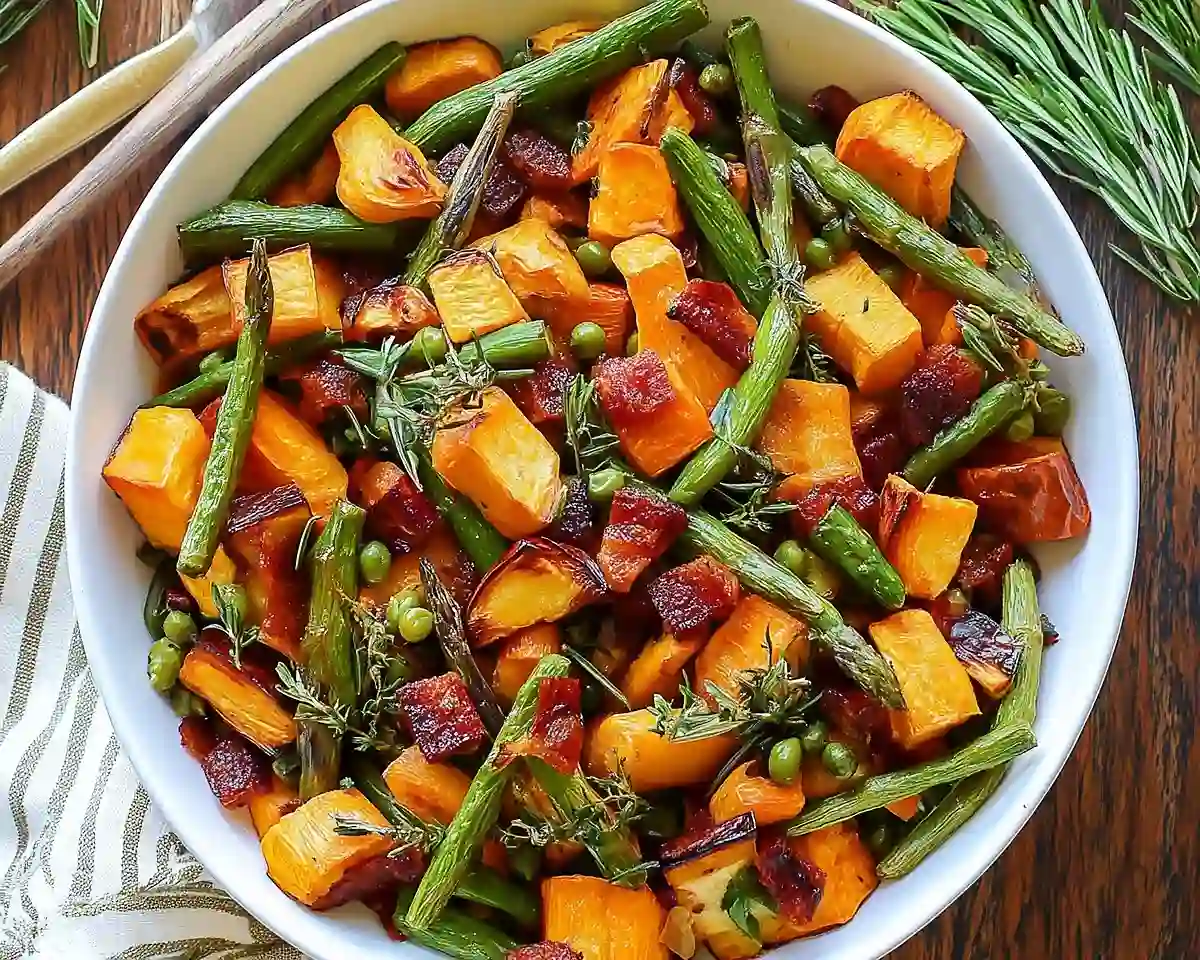Thanksgiving Roasted Veggies with bacon, butternut squash, and green beans. Easy sheet pan recipe ready in 30 minutes for your holiday table.
Last November, I stood in my kitchen surrounded by pots, pans, and absolute chaos. You know that moment when you realize you’ve complicated everything unnecessarily? Well, that was me.
My sister walked in, took one look at my disaster zone, and said something brilliant: “Linda, why are you making Thanksgiving so hard?”
She was right. I’d been overthinking the vegetable side dish for years. Boiling. Blanching. Multiple steps that left me exhausted before the turkey even hit the table.
That’s when I discovered the magic of roasted vegetables. More specifically, this game-changing combination of green beans and butternut squash with crispy bacon and pumpkin seeds.
The transformation was instant. Two sheet pans. Twenty-five minutes. One absolutely stunning side dish that had everyone asking for the recipe.
Now, here’s what makes this dish special. The green beans get these gorgeous caramelized spots. The butternut squash turns sweet and tender. Then you add bacon (because everything’s better with bacon) and toasted pumpkin seeds for crunch.
I’ve made this dish seventeen times since that Thanksgiving. Each time, it disappears before the turkey.
Table of Contents
Why This Recipe Works Every Single Time
Listen, I’ve tested countless Thanksgiving vegetable recipes. Most are either bland or require professional chef skills.
This one’s different. The secret lies in roasting each vegetable separately at the right temperature. Green beans need high heat to develop those crispy edges. Butternut squash requires slightly gentler treatment to caramelize without burning.
Here’s what sets this recipe apart:
The vegetables roast simultaneously on separate pans. No babysitting required. Meanwhile, the bacon adds smoky richness while pumpkin seeds contribute nutty crunch.
Julia Child always said vegetables need space to roast properly, not steam. That wisdom changed everything about my approach to holiday cooking.
The Ingredient Breakdown
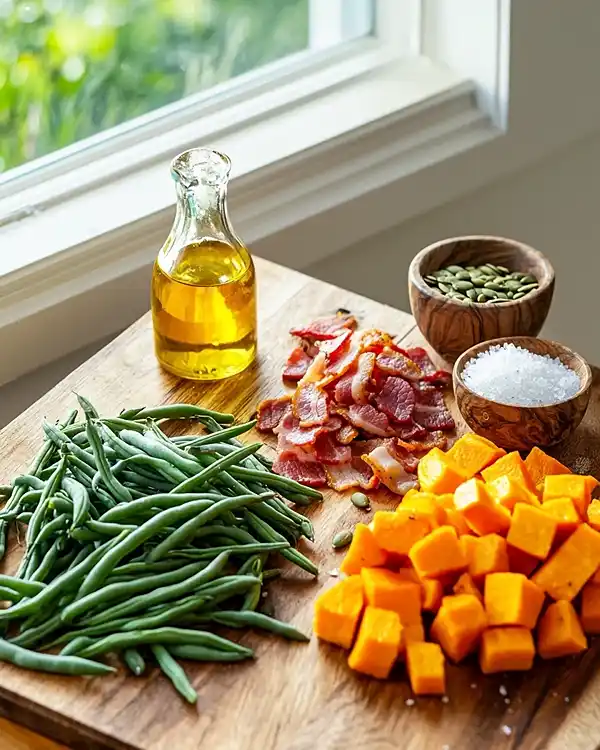
| Ingredient | US Measure | Metric | Notes |
|---|---|---|---|
| Green beans | 12 oz | 340g | Fresh, trimmed |
| Butternut squash | 12 oz | 340g | Peeled, cubed |
| Olive oil | 4 tbsp total | 60ml | Extra virgin preferred |
| Bacon | 6 slices | 170g | Thick-cut works best |
| Pumpkin seeds | ½ cup | 70g | Raw, for toasting |
| Salt & pepper | To taste | To taste | Kosher salt recommended |
Shopping Smart at American Grocery Stores
Most supermarkets now sell pre-cubed butternut squash in the produce section. Honestly, this saves fifteen minutes and eliminates the most annoying prep step.
For green beans, look for bright color and firm texture. Avoid any that bend easily or show brown spots.
Thick-cut bacon makes a difference here. The regular stuff cooks too crispy and loses that meaty texture. Check the bacon aisle for artisan or butcher-style options.
Pumpkin seeds are usually near the nuts or baking aisle. Buy raw ones—you’ll toast them yourself for better flavor control.
Essential Add-ins and Substitutions
For Bold Flavor:
- Fresh thyme (1 tablespoon)
- Garlic powder (1 teaspoon)
- Smoked paprika (½ teaspoon)
Substitutions:
- Brussels sprouts instead of green beans
- Sweet potato replaces butternut squash
- Turkey bacon for a lighter option
- Sunflower seeds swap for pumpkin seeds
International readers: Use 180g green beans and 180g squash if working with grams exclusively.
Equipment You Actually Need
Forget fancy kitchen gadgets. This recipe requires basic tools you probably own already.
Two large baking sheets are non-negotiable. Crowding vegetables on one pan creates steam instead of roasted perfection. I learned this the hard way during my second attempt.
Parchment paper prevents sticking and makes cleanup ridiculously easy. Alternatively, silicone baking mats work great and they’re reusable.
A large mixing bowl helps toss vegetables with oil evenly. A small skillet toasts pumpkin seeds perfectly. That’s it.
No food processor. No mandoline. No expensive roasting pans.
Thomas Keller emphasizes mise en place—everything prepped before cooking begins. Following this principle transforms your efficiency completely.
Step-by-Step Roasting Instructions
Getting Started: The Foundation
Preheat your oven to 425°F. This temperature creates the ideal environment for caramelization without burning.
Line both baking sheets with parchment paper. Position oven racks in the upper and lower thirds for even heat distribution.
Preparing the Green Beans
Trim the stem ends from your green beans. Leave the pointy tips intact—they get wonderfully crispy.
Toss green beans with 1 tablespoon olive oil in your large bowl. Add salt and pepper generously. Don’t be shy here.
Spread beans in a single layer on the first baking sheet. They shouldn’t overlap. Touching is fine, but piling creates steam.
Prepping the Butternut Squash
Using the same bowl (saves dishes!), toss cubed butternut squash with another tablespoon of olive oil. Season with salt and pepper.
Spread squash pieces on the second baking sheet, ensuring each cube has personal space.
Cut your cubes approximately 1-inch size. Consistency matters for even cooking.
The Roasting Process
Place both pans in the preheated oven. Set your timer for 15 minutes and walk away.
Resist the urge to check constantly. Opening the oven door releases heat and extends cooking time.
After 15 minutes, check the green beans. They should show golden-brown spots and slight shriveling. This indicates perfect doneness.
Remove the green bean pan from the oven. Reduce temperature to 400°F immediately.
Flip each butternut squash cube using a spatula. Return the pan to the oven for another 5-10 minutes.
The squash is ready when fork-tender and golden on multiple sides. Oops! I once left mine in too long and got butternut squash chips. Still delicious, but definitely not the intended texture.
The Bacon Situation
While vegetables roast, cook your bacon until crispy. I use a separate skillet over medium heat, flipping once.
Pat bacon with paper towels to remove excess grease. Chop into bite-sized pieces.
Toasting Pumpkin Seeds
Heat a small dry skillet over medium heat. Add raw pumpkin seeds and stir frequently.
Toast until seeds turn golden and start popping slightly—about 3-4 minutes. They smell amazing when ready, almost like warm bread with nutty undertones.
Assembly Magic
Transfer roasted green beans to a large serving bowl. Add butternut squash, chopped bacon, and toasted pumpkin seeds.
Toss everything together gently. The residual heat helps flavors meld beautifully.
Serve immediately or let cool to room temperature. Both temperatures work wonderfully.
The Optional (But Recommended) Dressing
Man, oh man, this dressing elevates everything to restaurant quality.
Combine these ingredients in a mason jar:
- 2 tablespoons olive oil
- Juice from one whole lime (freshly squeezed)
- 2 tablespoons honey
- 2 tablespoons Dijon mustard
Close the lid tightly and shake vigorously for 30 seconds. The mixture should look creamy and emulsified.
Drizzle over vegetables or serve alongside for guests who prefer lighter options.
The honey adds sweetness that balances the bacon’s saltiness perfectly. The lime brings brightness that cuts through rich flavors.
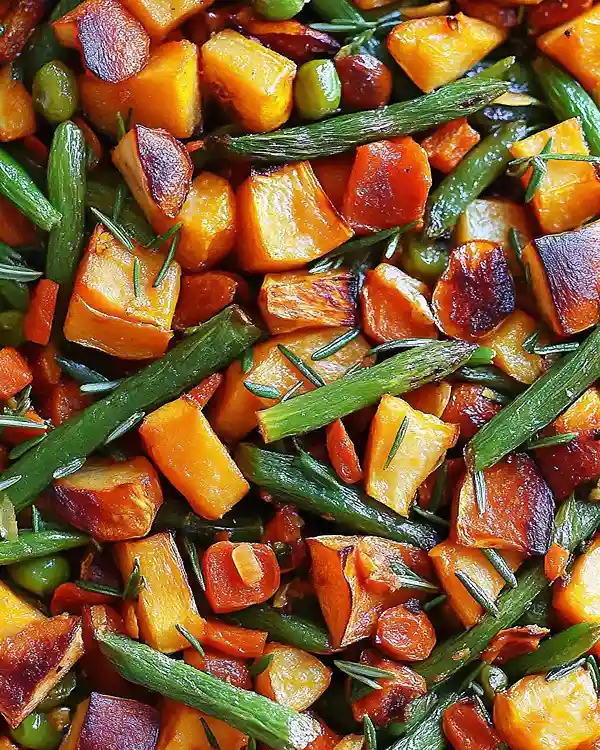
Roasted Green Beans and Butternut Squash Expert Tips for Holiday Success
Temperature Control Matters
Different vegetables roast at different rates. Green beans need that initial blast of high heat. Butternut squash benefits from slightly lower temperatures after the first roast.
Space Is Your Friend
Crowded vegetables steam instead of roast. This creates mushy texture instead of caramelized perfection. Always use two pans.
Make-Ahead Strategy
Cook bacon up to 3 days ahead. Store in the refrigerator in an airtight container.
Toast pumpkin seeds 2 days early. Keep at room temperature in a sealed bag.
Cut and cube butternut squash the night before. Store in the refrigerator in a covered bowl.
Creative Variations
Maple Bourbon Version: Replace honey dressing with maple syrup and add a splash of bourbon to the glaze.
Mediterranean Style: Skip bacon. Add feta cheese, olives, and oregano instead.
Southwestern Twist: Use cumin, chili powder, and lime. Top with pepitas and cotija cheese.
Holiday Cranberry: Toss finished dish with dried cranberries and chopped pecans.
Vegan Adaptation: Eliminate bacon entirely. Add smoked almonds or coconut bacon for similar texture.
Storage Guidelines
| Storage Method | Duration | Best Practice |
|---|---|---|
| Refrigerator | 3-4 days | Airtight container |
| Freezer | Not recommended | Texture degrades |
| Room temperature | 2 hours max | Food safety concern |
Reheat leftovers in a 350°F oven for 10 minutes. Microwaving works but reduces crispiness.
Perfect Thanksgiving Pairings
This dish complements traditional turkey beautifully. The smoky bacon echoes similar flavors in gravy.
Serve alongside garlic herb roasted potatoes for a complete vegetable spread that covers every texture preference.
Need more color on your table? Try honey glazed carrots with green beans as another option.
The vegetables also pair wonderfully with ham, pork roast, or even grilled chicken for non-Thanksgiving meals.
According to the USDA’s seasonal produce guide, both butternut squash and green beans peak during fall months, making this dish ideal for autumn gatherings.
Roasted Green Beans and Butternut Squash FAQs
What are the best roasted vegetables for Thanksgiving?
The best roasted vegetables for Thanksgiving include butternut squash, green beans, Brussels sprouts, carrots, and sweet potatoes because they handle high heat beautifully and develop caramelized flavors.
What vegetables are good for Thanksgiving?
Good vegetables for Thanksgiving include traditional choices like green beans, squash varieties, root vegetables, and cruciferous options that complement turkey’s rich flavors perfectly.
Can I roast vegetables the day before Thanksgiving?
You can roast vegetables the day before Thanksgiving, but they lose some crispiness—reheat uncovered at 350°F for best texture restoration.
Which vegetables are best for roasting?
The best vegetables for roasting include dense options like butternut squash, carrots, Brussels sprouts, cauliflower, and green beans that develop sweet, caramelized exteriors.
Making This Thanksgiving Roasted Veggies Recipe Your Own
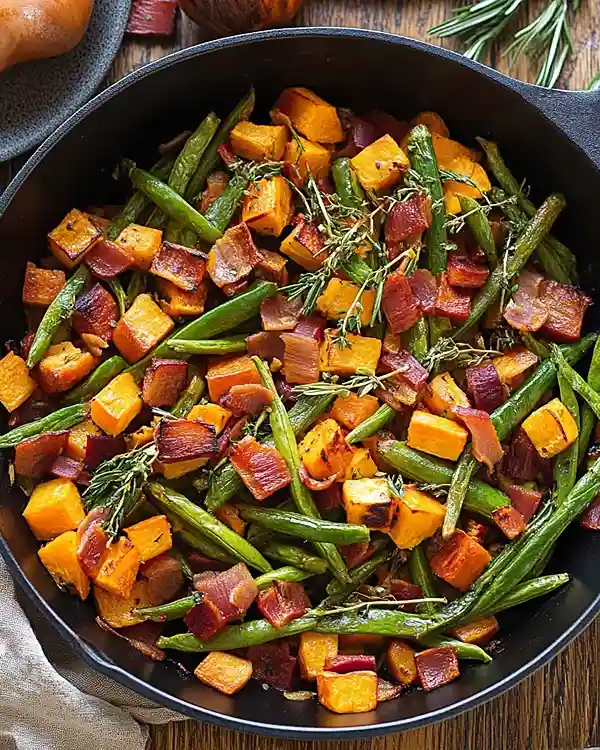
Let me tell you something important. The first time I made Thanksgiving roasted veggies, I followed every rule perfectly. The result was good but safe.
The second time, I experimented. Added extra garlic. Threw in some rosemary. Suddenly, this dish became memorable instead of just acceptable.
Don’t be afraid to adjust. Your family’s taste preferences matter more than rigid recipe rules.
Some households love spicy food—add red pepper flakes. Others prefer sweeter profiles—increase the honey in the dressing.
The beauty of roasted vegetables lies in their versatility. The technique stays consistent while flavors adapt to your needs.
This Thanksgiving, imagine walking into your kitchen without stress. Picture perfectly roasted vegetables that required minimal effort but maximum flavor.
That’s exactly what this recipe delivers.
The bacon adds richness. The pumpkin seeds provide crunch. The vegetables themselves shine through with natural sweetness enhanced by caramelization.
Your guests will ask how you made something so simple taste so incredible. You’ll smile, knowing the secret was always simplicity itself.
Need dessert inspiration after this savory masterpiece? Check out chocolate pudding dirt cake or Halloween Oreo brownies for sweet endings.
This Thanksgiving, let roasted vegetables steal the show. Your stress levels will thank you. Your guests will thank you. Most importantly, you’ll actually enjoy cooking instead of dreading it.
Now get those sheet pans ready. Your best Thanksgiving side dish awaits.
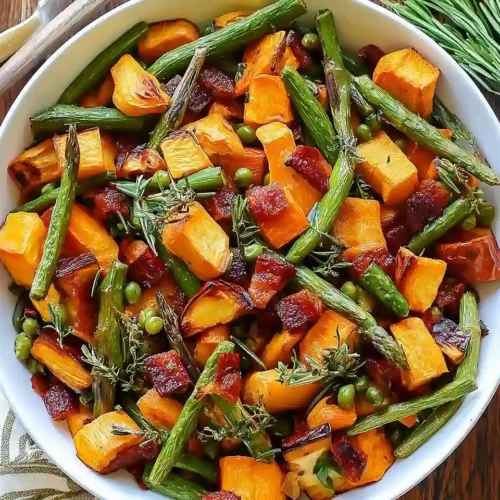
Thanksgiving Roasted Veggies with Crispy Bacon and Seeds
Equipment
- Baking sheets
- Parchment paper
- Mixing bowl
- Skillet
- spatula
Ingredients
Main
- 340 g Green beans Fresh, trimmed
- 340 g Butternut squash Peeled, cubed
- 60 ml Olive oil Extra virgin preferred
- 6 slices Bacon Thick-cut works best
- 70 g Pumpkin seeds Raw, for toasting
- Salt & pepper To taste, Kosher salt recommended
Optional Add-ins
- 1 tbsp Fresh thyme Optional
- 1 tsp Garlic powder Optional
- ½ tsp Smoked paprika Optional
Instructions
- Preheat oven to 425°F (220°C) and line two baking sheets with parchment paper. Position racks in the upper and lower thirds of the oven.
- Toss green beans with 1 tablespoon olive oil, salt, and pepper. Arrange on one baking sheet in a single layer.
- Toss butternut squash cubes with 1 tablespoon olive oil, salt, and pepper. Arrange on the second baking sheet.
- Roast both pans for 15 minutes. Remove green beans and reduce oven temperature to 400°F (200°C). Flip squash and continue roasting 5–10 minutes until golden and tender.
- Meanwhile, cook bacon in a skillet over medium heat until crispy. Drain and chop.
- Toast pumpkin seeds in a dry skillet over medium heat for 3–4 minutes until golden and fragrant.
- Combine roasted green beans, squash, chopped bacon, and toasted pumpkin seeds in a serving bowl. Toss gently and serve warm or at room temperature.
- (Optional) Whisk or shake together 2 tbsp olive oil, juice of 1 lime, 2 tbsp honey, and 2 tbsp Dijon mustard for dressing. Drizzle over vegetables before serving.

